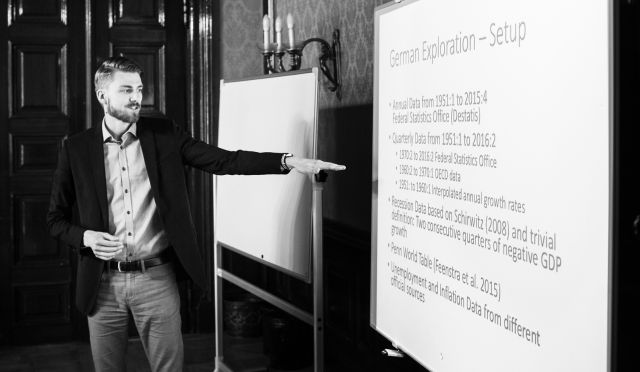Third New Economic Talent competition interview is here: meet Sebastian Beug (Humboldt University of Berlin), who was awarded a second place (jointly with Kyung Woong Koh from the Yonsei University) for his paper “Federal Governments and the German Economy – An Empiric Exploration”.
- On a personal level, what drives you to study Economics?
In Economics, the ways of thinking are highly structured. Though originally a social science, it involves tools from natural sciences. When I enrolled at university, Economics was my minor and History my major. I changed my plans because Economics challenged me more in the ways it is taught and applied. Theory and additionally empiric shape the structures of the Economic way of thinking.
Economic reasoning skills are valuable tools in other fields. For almost seven years, I have pursued a career as a journalist, mostly part-time, through freelance work and internships. I have to admit that my background in Economics, which also involves quantitative methods, is a rare qualification in the media industry and thus is considered an advantage.
- Who has inspired you most during your studies?
I thank my thesis advisor, Prof. Jochen Kluve, an expert on labor markets and empirical and econometrical methods, for pointing out that good research always involves both theory and empirics. Methods used in causal analysis and experiments – natural or constructed – allow economists to verify or dismiss conjectures. And some investigations, for example on job market policies, can literally bring Economists down to earth where their advice affects people.
At Humbolt University, Prof. Michael Burda is also doing inspiring work in the fields of Economic Growth and Economic Integration, and Prof. Nikolaus Wolf in the field of Economic History.
- What is the most important key to choosing the right topic for a thesis?
Of course, it should be a topic from a field you have an interest in, say Political Economy. Generally speaking, a thesis has one aim: to prove your ability to work scientifically after graduation. This involves identifying a niche (“Did anybody ever investigate partisan theory in post-war Germany in detail?”) and formulating a research question. From day one, I considered my thesis rather as a research project than a thesis. This kept me motivated.
- Is there any skill that you find very useful for your economic research, but which you learned outside of the field?
Formulas can get messy, and so can paragraphs and sentences. If you are doing Economic research, you want others to read it. At university, writing is an often-neglected skill. My work as a journalist helped me to improve my skills. As English is not my native language, a journalism class abroad at New York University brought me a leap forward. Clear and concise writing can be trained – almost like calculus.
- What are you looking forward to most in the near future?
I have at least a year until I start a full-time position and I am thankful that I can pursue a path in graduate studies in Economics at Humboldt University while working in a fast-paced environment.
Thank you, Sebastian, for your time. We wish you all the best for all your future projects!
